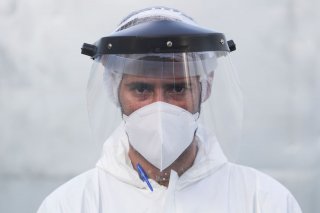New Study Shows Coronavirus Antibodies Dissipate Over Time
But that does not necessarily mean that cells do not remember how to spot and fight the virus once someone is healed.
Antibodies contracted from the coronavirus can disappear after about three months, according to a new clinical study.
Héma-Québec, a Quebec blood agency, followed plasma units from coronavirus donors and discovered “around Week 11 after the disease onset, or about 80 days, we saw in each of these donors a very significant decrease in the level of antibodies,” Dr. Rénée Bazin of Héma-Québec told the Montreal Gazette.
“We followed 15 plasma donors who donated four to nine times,” Bazin said. “Our study showed that after 114 days after the disease onset … we could look at the evolution or the persistence of the antibodies in these donors.”
Antibodies are proteins created by the body’s immune system after being exposed to the coronavirus or after being infected.
Bazin also noted that although donors had different levels of antibodies depending on the “severity” of the virus, donors experienced major declines in them after about eighty days.
The decrease in the protective proteins indicates the “virus is probably eliminated or the person is now cured, or they are well and their antibodies just disappeared. That doesn’t mean there is no (cell) memory,” according to Bazin.
Bazin added that although antibodies may dissipate over time, the immune system can “develop a memory for the virus,” which would provide more protection if exposed to coronavirus a second time.
Dr. Michael Mina, an immunologist at Harvard University, made a similar statement to The New York Times about coronavirus antibody levels.
“Even if their antibodies wane below the limits of detection of our instruments, it doesn’t mean their ‘memory’ is gone,” Dr. Mina said. This memory will likely provide cellular immunity and shielding from the coronavirus.
“So if people are exposed a second time to the virus, maybe all these cells will just wake up and start to produce antibodies again. We don’t know that yet,” Bazin said. “But it’s not like the antibodies disappear so you’re not protected anymore. We know that there is memory in our immune system, but it will probably take more time to see whether this memory is very active, if it lasts very long.”
The U.S. has seen more than 4.3 million confirmed cases, with more than 150,000 deaths as of Tuesday, according to Johns Hopkins University data.
Dr. Anthony Fauci, America’s top infectious disease expert, told ABC’s “Good Morning America” on Tuesday that the number of positively tested cases in the Midwest “are starting to have that very early indication” of a spike.
Southern states, including Florida, Texas, and Arizona, have become hotspots for the virus in recent weeks, all ranking in the top ten for the highest number of cases in the United States.
Rachel Bucchino is a reporter at the National Interest. Her work has appeared in The Washington Post, U.S. News & World Report and The Hill.
Image: Reuters

